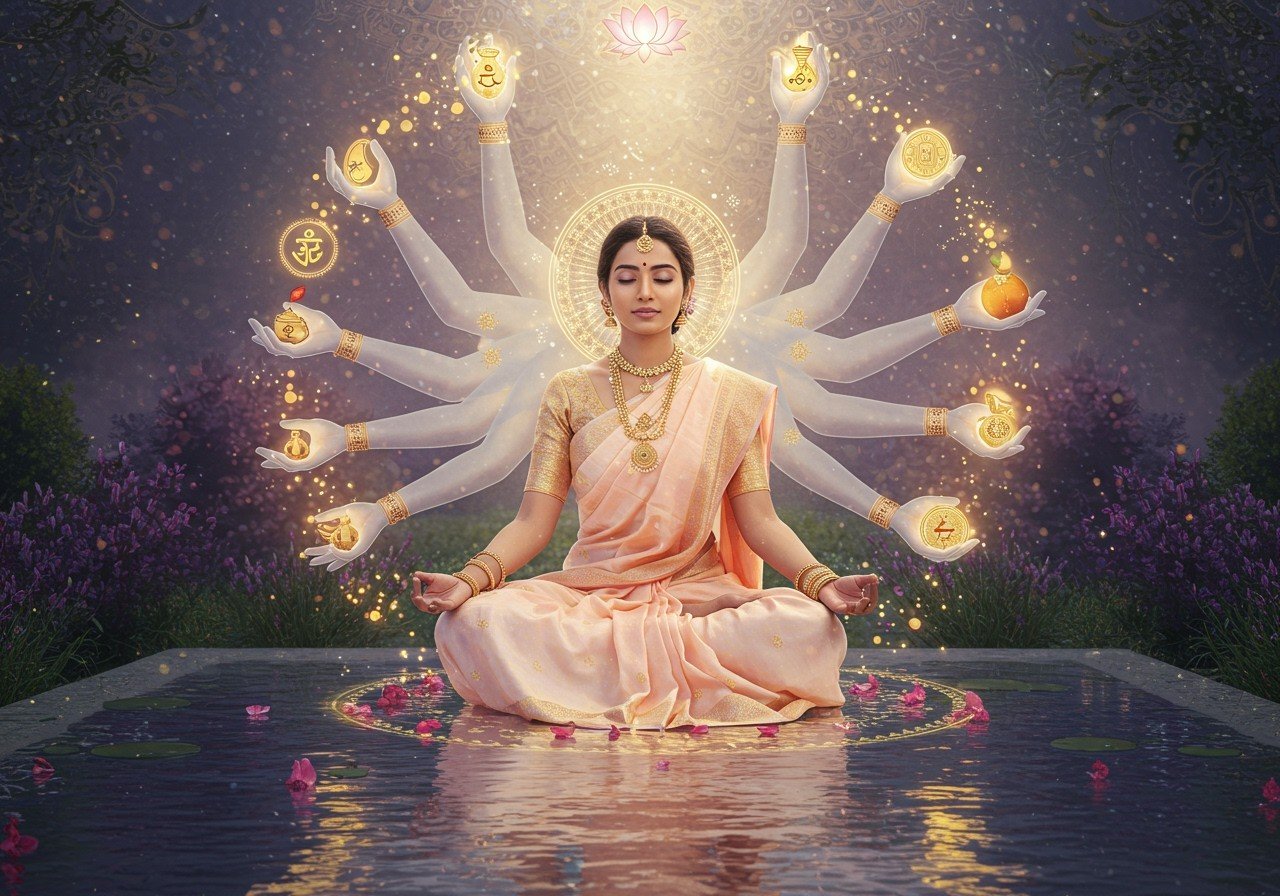Karma and Gratitude: Cultivating a Fulfilling Life

In Indian culture, karma and gratitude are deeply intertwined. Karma, the principle of cause and effect, suggests that our actions shape our future. Gratitude, the practice of thankfulness, can positively influence our karma and overall well-being. These concepts resonate deeply with many Indians, particularly those aged 25-60, seeking spiritual growth and a balanced life. With the rise of online resources, integrating these ancient practices into modern life has become more accessible than ever.
Understanding Karma
Derived from Sanskrit, karma signifies “action” or “deed”. It represents the spiritual principle of cause and effect where intentions and actions influence the future. Righteous actions, or Dharma, lead to positive karma. Karma manifests in three forms: Sanchita (accumulated), Prarabdha (present life), and Kriyamana (new). It plays a role in shaping our personal and professional relationships daily.
The Power of Gratitude
Gratitude is the feeling of thankfulness and appreciation. It has been linked to improved mental health and stronger relationships. Practicing gratitude can enhance spiritual well-being and balance karma. Simple practices like keeping a gratitude journal or expressing thanks to others can have a profound impact. Gratitude holds a significant place in Indian traditions and rituals.
Karma and Gratitude in Daily Life
Start your day with gratitude meditation or prayer to cultivate positivity. Mindful decision-making, aligned with positive karma, can transform your daily life. Gratitude can be a powerful tool in resolving conflicts and managing stress, leading to a more harmonious existence. Involving family in gratitude practices strengthens bonds and fosters a shared sense of appreciation.
Karma, Gratitude, and Spiritual Growth
Both karma and gratitude contribute to spiritual development by increasing self-awareness and promoting personal growth. Introspection helps us understand karmic patterns, while gratitude fosters a deeper connection with the divine. Practices like yoga and meditation enhance these concepts, leading to a more meaningful life.
Cultural Perspectives on Karma and Gratitude
Indian traditions offer diverse interpretations of karma and gratitude. Hinduism, Buddhism, and Jainism have all shaped these concepts, adding rich layers of meaning. Festivals like Diwali celebrate gratitude, while cultural stories and teachings passed down through generations emphasize the importance of these values.
Practical Tools for Enhancing Karma and Gratitude
Numerous resources can support your journey of cultivating karma and gratitude. Books, courses, and apps offer valuable insights and practical techniques. Incorporating traditional rituals into your daily life and creating a home altar for reflection can deepen your practice. Community events provide opportunities for shared spiritual growth. Online stores like poojn.in offer authentic ritual items that can enhance your practices.
How Gratitude Improves Karma
Gratitude and karma are intricately connected, influencing our life’s journey, experiences, and relationships. Practicing gratitude can attract positive karma, repel negative energy, and promote ethical behavior. It aligns with spiritual teachings, fostering harmony and balance.
Attracts Positive Karma
Gratitude acts as a magnet for happiness and positive energy. By focusing on the good, we invite positivity into our lives, attracting good karma and creating a smoother, more joyful path. It uplifts our spirits and creates a ripple effect of positivity.
Repels Negative Energy
Negativity can cloud our judgment and affect our well-being. Gratitude acts as a shield against toxic thoughts and emotions, allowing us to focus on what truly matters and preventing negative karma from taking root. This protective effect helps maintain a positive outlook.
Promotes Ethical Behavior
Being thankful influences our actions and encourages kindness and ethical conduct. When we appreciate what we have, we are more inclined to spread joy and contribute positively to the lives of others, creating a virtuous cycle. It fosters compassion and empathy.
Aligns with Divine Teachings
Gratitude connects us with universal laws, ensuring balance and contributing to the well-being of all. It fosters a deeper spiritual connection, enriching our souls and aligning us with a higher purpose. It strengthens our sense of interconnectedness.
Practical Ways to Practice Gratitude
Cultivating gratitude in daily life is simple yet rewarding. Here are some ways to integrate this powerful habit:
Gratitude Journal
Begin a gratitude journal and jot down 3-5 things you are thankful for each day. Be specific, noting details like the warmth of the sun or a loved one’s smile. This shifts your focus to the positive aspects of your life and reinforces appreciation.
Gratitude Rituals
Incorporate gratitude into your daily routine. Express thanks upon waking for a new day and offer gratitude before meals. These small rituals enhance your spiritual connection and cultivate a mindset of appreciation throughout the day. They create a sense of sacredness in everyday moments.
Mindful Appreciation
Take a moment to savor the present. Whether it’s feeling the sun’s warmth or enjoying a cup of tea, immerse yourself fully in the experience. This mindful appreciation deepens your gratitude practice and enhances your awareness of life’s simple pleasures. It cultivates presence and awareness.
Express Gratitude to Others
Express thanks to those who enrich your life. Write letters, offer kind words, or perform small gestures of appreciation. These acts strengthen bonds and spread positivity, fostering stronger and more meaningful connections.
Gratitude Meditations
Dedicate a few minutes each day to gratitude meditation. Focus on what you are thankful for, allowing yourself to deeply feel the appreciation. This practice calms the mind, nurtures the soul, and reinforces a positive outlook.
Acts of Kindness
Helping others can bring immense joy and create positive karma. Volunteer your time, offer assistance, or perform small acts of kindness. These gestures create a ripple effect of positivity, touching lives beyond your own.
Reframe Challenges
View challenges as opportunities for growth and learning. Ask yourself what you can gain from difficult situations. This mindset transforms obstacles into valuable lessons, enriching your journey and fostering resilience.
Positive Mindset
Start each day with a positive affirmation or meditation. Focusing on the bright side cultivates a mindset that attracts good karma and sets a cheerful tone for the day ahead. This helps maintain optimism and resilience.
Be Mindful of Your Actions
Pay attention to your actions and their impact. A simple smile or a helping hand can brighten someone’s day. Consciously practice kindness, creating a positive environment for yourself and others. This fosters mindful interactions and a sense of responsibility.
Self-Care and Self-Respect
Honor your needs and boundaries. Practice self-compassion and avoid self-criticism. Use positive affirmations to reinforce self-love and respect, fostering a healthy and positive self-image.
Other Tips
Forgiveness plays a crucial role in inner peace. Let go of resentment and offer forgiveness freely. Accept responsibility for your actions and maintain calmness during challenging times. Offering your karma to a higher power can bring solace, allowing you to focus on doing good and trusting the universe’s plan.
How Poojn.in Supports Your Gratitude Journey
Poojn.in offers a wide selection of authentic puja items and sacred materials to enhance your practice of gratitude. Our collection includes:
- Complete Puja Kits: Convenient sets containing everything you need for gratitude ceremonies. This simplifies the process and ensures you have all the essentials.
- Holy Idols: Sacred murtis of deities to focus your devotion and gratitude. These serve as a focal point for your spiritual practice.
- Traditional Utensils: Pure copper and brass items for offering prayers and performing rituals. The quality and authenticity enhance the spiritual significance.
- Puja Samagri: Essential items such as incense, sandalwood, flowers, and other offerings. These enhance the sensory experience and create a sacred atmosphere.
- Holy Food Items: Pure and natural ingredients for preparing prasad. These offerings symbolize gratitude and reverence.
We deliver these items directly to your doorstep across India with secure packaging, making it convenient to incorporate gratitude practices into your daily life. Each product is quality-assured and certified for authenticity.
For your daily puja, we recommend:
Visit www.poojn.in to explore our complete collection.
Embrace the Journey with Gratitude
In the journey of life, gratitude and karma play a guiding role. They enrich our experiences, relationships, and spiritual growth. Nurturing gratitude cultivates joy and invites positive karma. Embrace the simple practices of gratitude and witness the harmony they bring to your everyday life. Your path will become brighter, filled with peace and positivity.
FAQs on Karma and Gratitude
What is the connection between Karma and gratitude? Karma and gratitude are linked by the concept of positive energy. Practicing gratitude generates good vibes, which can manifest as positive karma, creating a cycle of positivity.
How does practicing gratitude influence Karma? Gratitude helps us focus on life’s positive aspects. This positive mindset can lead to actions that create good karma, increasing kindness and positivity. It encourages actions aligned with dharma.
Why is gratitude important in daily life? Gratitude shifts our focus from what we lack to what we have, improving mood, relationships, and overall well-being. It fosters contentment and appreciation.
Can gratitude change your Karma? Yes, gratitude can influence karma. By appreciating what we have, we attract more positive experiences and relationships, thereby enhancing our karmic balance.
How can I practice gratitude daily? Maintain a gratitude journal, express thanks to others, or simply reflect on things you appreciate. These practices cultivate a thankful mindset, making gratitude a habit.
What are some ways Karma affects our lives? Karma reflects our actions and intentions. Good deeds often lead to positive experiences, while negative actions can create challenges. Understanding this encourages mindful choices.
Is there a spiritual aspect to Karma and gratitude? Many believe that gratitude and karma are connected to spiritual growth, fostering mindfulness, compassion, and a deeper understanding of the world. They are seen as pathways to enlightenment.
Can gratitude improve my relationships? Gratitude fosters mutual respect and understanding in relationships, strengthening bonds and creating more harmonious connections. It promotes empathy and appreciation.


